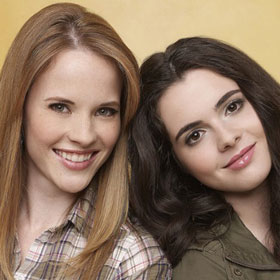Switched At Birth

3.5/5
ABC Family’s newest drama, Switched at Birth, is more family-friendly than some of the channel’s recent shows. Unlike the highly-sexualized The Secret Life of the American Teenager and the intensely dramatic Pretty Little Liars, Switched at Birth is something that all family members, both young and old, can agree on watching. It stays true to ABC Family’s traditional roots, bringing the ‘Family’ back into the picture. However, the show is as contemporary as it is traditional, so it has a little something for everyone.
The premise itself is, of course, highly unrealistic: that two girls were switched at birth, and their families find out about it only when the girls are teenagers. Nevertheless, the story is made believable, and even to some extent, relatable, thanks to the outstanding acting for the two leads. Vanessa Marano (Gilmore Girls) plays Bay Kennish, the daughter of a wealthy family who lives in a huge house, attends an expensive private school, and leads an otherwise privileged life. She is rebellious and artistic, although a little unsure of herself and her place in her family.
Katie Leclerc plays Daphne Vasquez, the deaf daughter of a single Puerto Rican mother (Constance Marie, George Lopez), who lives a lower-class life in a house with bars on the windows, and attends a school for deaf students. She is confident and assertive, and doesn’t seem as fazed as Bay by the news of her being switched at birth. She has lived the life Bay was supposed to live, and a theme of “what my life would have been like if…” seems like it will recur throughout the series.
Daphne is biologically the Kennishes’ child, while Bay is actually a Vasquez. They truly resemble their biological families, both physically and personality-wise. However, they are loved dearly by the families they’ve known since they were babies, but those families aren’t the ones they were supposed to be with.
The whole premise of the show is intriguing, even though it’s not a new one. The concept borrows from the common plot of babies being switched at birth, which has been used since the 18th century. It seems to keep popping up over time because people find it fascinating. It’s so unrealistic, but at the same time it seems like something that could actually happen. In very rare instances, it has happened, but that’s beside the point. The point is that it’s an incredibly interesting concept, and it has been for a very long time.
It doesn’t matter that most people can’t relate to the premise, because they can relate to the family dynamic in some way. Most teens could relate to Bay’s struggles to figure out who she is and how she belongs. Parents could relate to the anger and confusion of Bay’s and Daphne’s parents at finding out their child was switched with another person’s child. Deaf people could relate to the experiences of the deaf characters on the show, as well as to the ignorance of non-deaf people. Stereotypes, ignorance, and entitlement play a part in the show, as well as familial love, the concept of what it means to be a family, family and social class dynamics, and even a bit of romance. This show is more complex than meets the eye, and it will be very interesting to see how it all plays out in future episodes.
RELATED ARTICLES
Get the most-revealing celebrity conversations with the uInterview podcast!







Leave a comment